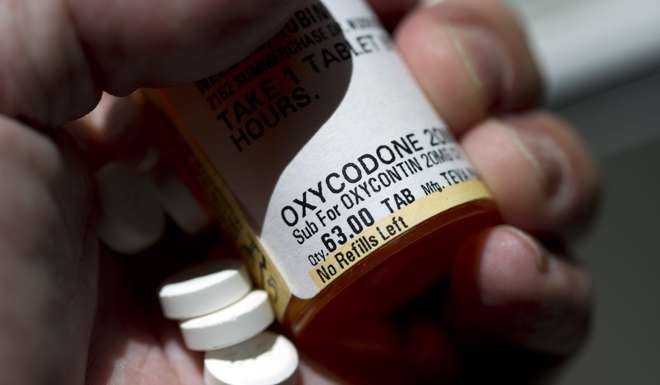
The big push: opioid epidemic is killing OxyContin’s US market, so makers target developing world

OxyContin is a dying business in America.
With the US in the grip of an opioid epidemic that has claimed more than 200,000 lives, the American medical establishment is turning away from painkillers. Top health officials are discouraging primary-care doctors from prescribing them for chronic pain, saying there is no proof that they work long-term and substantial evidence that they put patients at risk.
Prescriptions for OxyContin have fallen nearly 40 per cent since 2010, meaning billions of dollars in lost revenue for its Connecticut manufacturer, Purdue Pharma.

A network of international companies owned by the family is moving rapidly into Latin America, Asia, the Middle East, Africa and other regions, and pushing for broad use of painkillers in places ill-prepared to deal with opioid abuse and addiction.
It’s right out of the playbook of Big Tobacco. As the United States takes steps to limit sales here, the company goes abroad
In the global drive, the companies, known as Mundipharma, are using some of the controversial marketing practices that made OxyContin a pharmaceutical blockbuster in the US.
In Brazil, China and elsewhere, the companies are running training seminars at which doctors are urged to overcome “opiophobia” and prescribe painkillers. They are sponsoring public campaigns that encourage people to seek medical treatment for chronic pain. They are even offering patient discounts to make prescription opioids more affordable.
US Surgeon General Vivek H. Murthy said he would advise his peers abroad “to be very careful” with opioid medications and to learn from American “missteps.”
“I would urge them to be very cautious about the marketing of these medications,” he said in an interview. “Now, in retrospect, we realise that for many the benefits did not outweigh the risks.”

Some Mundipharma representatives and promotional material have downplayed the risk that patients will become addicted to their opioid medications. Those claims recall the initial marketing of OxyContin in the US in the late 1990s when Purdue deceived doctors about the drug’s addictiveness.
Purdue and three executives pleaded guilty in 2007 to federal charges of misbranding drugs and were ordered to pay US$635 million. The Drug Enforcement Administration said in 2003 that the company’s “aggressive, excessive and inappropriate” marketing “very much exacerbated” abuse and criminal trafficking of OxyContin.
I think unfortunately you may not have all the tools you need to properly address pain
Purdue was a small New York City pharmaceutical firm when brothers Mortimer and Raymond Sackler, both psychiatrists, bought it in 1952. The spectacular success of OxyContin has generated nearly US$35 billion in revenue over the past two decades and made the Sacklers one of the nation’s wealthiest families.
Family members declined to be interviewed for this story, as did executives who run their international companies.
In a statement, Mundipharma International, which is based in Cambridge, England and responsible for European operations, said it was “mindful of the risk of abuse and misuse of opioids” and was “drawing on the experiences and insights of the US in tackling this issue.”
Mundipharma said those efforts include seeking regulatory approval in Europe for a formulation of OxyContin already sold in the US that deters certain forms of abuse, and introducing another opioid painkiller, Targin, with similar abuse-deterrent properties.
Promotional videos for Mundipharma, which feature smiling people of many ethnicities, suggest that the companies regard OxyContin’s US success as merely a beginning.
“We’re only just getting started,” the videos declare.
Joseph Pergolizzi Jr is a Florida doctor who talks up opioids to foreign doctors for Mundipharma.
In April, Pergolizzi was in Rio de Janeiro at a cancer pain seminar sponsored by the company. For an hour, Pergolizzi lectured the gathered physicians in English about the use of opioids in cancer patients and those with what he called “the death sentence of chronic pain.”
Brazil had stepped up its use of painkillers in recent years, he said, but “you are still low” compared with the US, Canada and Europe.
“I think unfortunately you may not have all the tools you need to properly address pain,” he said, according to a video of the seminar posted online by Mundipharma.
Consultants like Pergolizzi are key to helping Mundipharma overcome one of its greatest obstacles to selling painkillers abroad: Doctors’ aversion to prescribing narcotics. For generations, physicians have been taught that opioid painkillers are highly addictive and should be used sparingly and primarily in patients near death.
Mundipharma executives and consultants call this “opiophobia” and top company officials have said publicly that success in new markets depends on defeating this mindset.
Dr Barry Cole, a Reno psychiatrist and pain management specialist, started giving speeches about OxyContin for Purdue the year the drug hit the market. In recent years, he moved to the company’s international operation in a consulting role he described in an online resume as a “pain ambassador,” teaching the use of opioids to doctors in Colombia, Brazil, South Korea, the Philippines, China and Singapore.
“Any side effect is reversible when treatment is discontinued, and there is no permanent damage to the body,” Cole told a 2014 conference of pain specialists in Veracruz, Mexico, according to account of the presentation published on Mexican health websites.
In an interview, Cole said he made the foreign presentations despite having developed deep misgivings about the use of OxyContin and similar drugs in the US.
He defended his work promoting opioids to foreign doctors, saying terminally ill patients were dying in pain in many places he visited. He said he never shied away from questions about abuse and had no way of knowing whether his talks led doctors to prescribe more opioids.
“You show up, do a presentation and then you get back on the plane and are gone,” he said. He said he stopped making appearances for Mundipharma last year.
Mundipharma turned its focus to the developing world in 2011, as US sales began their drop.
It expanded first in Asia, then Latin America and then the Middle East and Africa, and now sell in 122 developing markets.
Revenues for Mundipharma Emerging Markets, the Singapore-based company that oversees developing-world operations, have risen 800 per cent over the last five years to about US$600 million annually. A Mundipharma spokeswoman said that growth included revenue from deals the companies have made with other manufacturers to sell nonopioid products.
Raman Singh, head of Mundipharma Emerging Markets, has said publicly that pain treatment in Asia is 1/50th of what it should be. Half the company’s worldwide sales in the developing world, which include products other than painkillers, already come from China, according to Mundipharma, and China is central to the Mundipharma’s global strategy.
Thousands of Chinese doctors have attended training seminars about Mundipharma’s drugs, and it claims a 60 per cent share of the cancer pain market. Mundipharma has sponsored clinical trials of OxyContin and Targin at hospitals across the country.
There remains, however, a deep-seated fear of opioids stemming from the 19th century Opium Wars that left millions addicted. Under strict government regulations, patients can purchase OxyContin only from hospital or other medical institutions, and can receive no more than a 15-day supply. Relatively few Chinese use Mundipharma’s painkillers for chronic pain because of their high price.